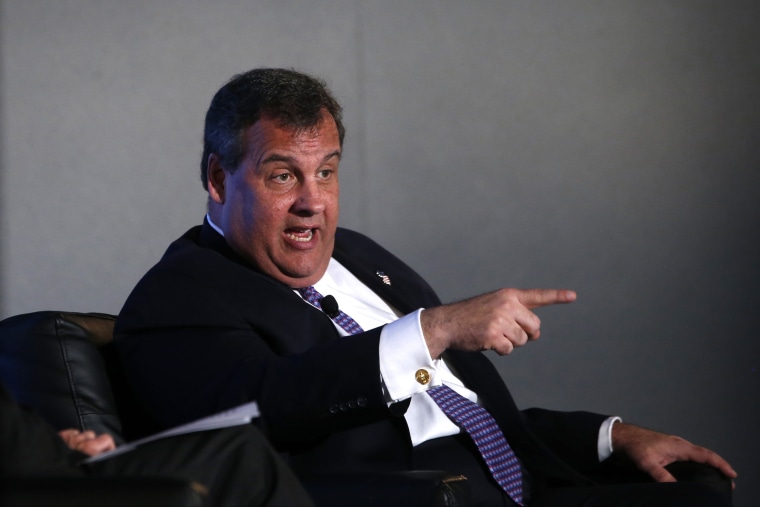New Jersey Gov. Chris Christie (R) was among the many special guests to appear at the dedication ceremony this morning for the Sept. 11 museum, and
according to the Associated Press, the original program called for Christie's remarks at the event to be followed by Idina Menzel's performance of "Bridge Over Troubled Water."
"A last-minute change prevented what could have been an uncomfortable moment," the AP
reported.
Perhaps, though at this point, it would have been the least of the governor's troubles.
For example, Christie was a featured guest yesterday at an event on fiscal responsibility, despite the fact that since he became governor, New Jersey's debt has been downgraded a record six times and the state is currently facing a serious shortfall. As the
New York Times reported, "The event's timing was awkward for both Mr. Christie and his hosts at the Peter G. Peterson Foundation, which invited him on the program for his experience 'balancing difficult fiscal choices.'"
Dana Milbank
discovered that the governor is taking responsibility in his preferred way -- by finding someone else to take the blame.
CBS News's Bob Schieffer ... laid out the bad news: $807 million budget shortfall; downgrades by credit-rating agencies; worry that the state can't pay its pension obligations; and slow job growth. "Not so long ago, people were talking about the New Jersey miracle," the genial newsman said. "Now suddenly the news is not so good about New Jersey." Christie did what any strong leader would do when presented with such facts: He blamed the economists. "They overestimated our revenue," he said.
This is marginally better than Christie's original line -- the governor initially tried to
blame President Obama -- but the fact remains that David Rosen, the chief budget officer for the last 30 years for New Jersey's Office of Legislative Services,
specifically warned state officials that the governor's projections simply weren't reliable. Instead of listening to Rosen, Christie
mocked and bullied him.
Asked about the state struggling to pay for its pension, the governor went on to blame New Jersey's four previous governors.
Christie added that his bridge scandal -- which, coincidentally, he also blamed on everyone else -- would be little more than a "footnote" in his political legacy. "My future is going to be based upon the record" of his fiscal management, the governor concluded.
After six debt downgrades and a massive budget shortfall, Christie probably ought to hope he's mistaken.
As for the still-lingering bridge scandal, Bill Stepien, Christie's former campaign manager, is more than a little upset about the widely-panned Mastro report -- generally seen as taxpayer-financed propaganda intended to clear the governor. Yesterday, Stepien's lawyer insisted that Christie's lawyers retract the "
false and misleading statements" they published about Stepien or they'll sue.
And speaking of Stepien, the editorial board of the
Star-Ledger, New Jersey's largest newspaper,
added today:
According to Tuesday's testimony from Michael Drewniak, the governor's pugilistic press secretary, Christie wondered aloud during a Dec. 5 meeting whether Stepien was deceiving him by hiding what he knew of the lane closures. "I always wondered if Stepien knew more about this," the governor said, according to Drewniak. That revelation is potentially damaging to the governor. For one, he claimed unequivocally during a Dec. 13 press conference that no one in his inner circle knew about the lane closures. Drewniak's testimony indicates that the governor had his suspicions, but decided to keep them secret. It is also revealing, and a bit revolting, to note that Drewniak watched the governor make this misleading statement without making a peep. So how can the governor explain this one away? Another convenient memory lapse. Asked about it on his 101.5 FM radio show Tuesday night, the governor said he has "very little recollection of that conversation."
The "footnote" rhetoric is clearly an example of wishful thinking, not a reliable prediction.
